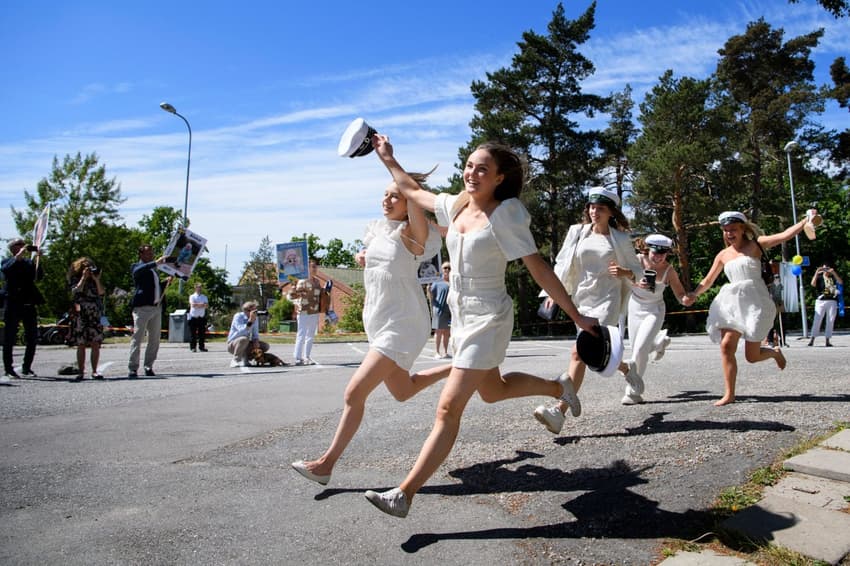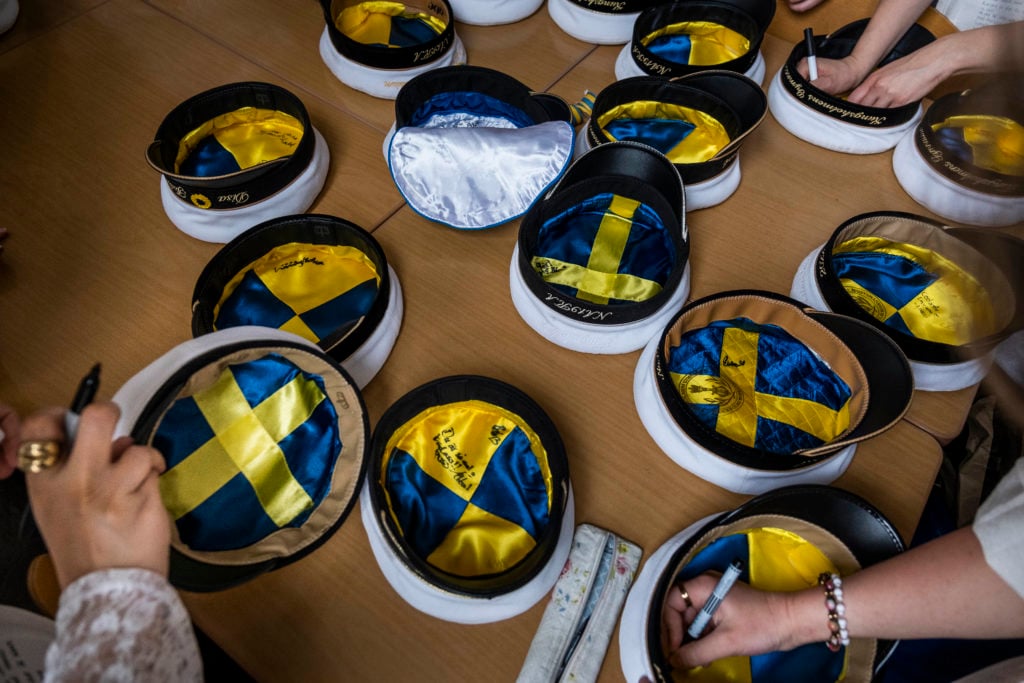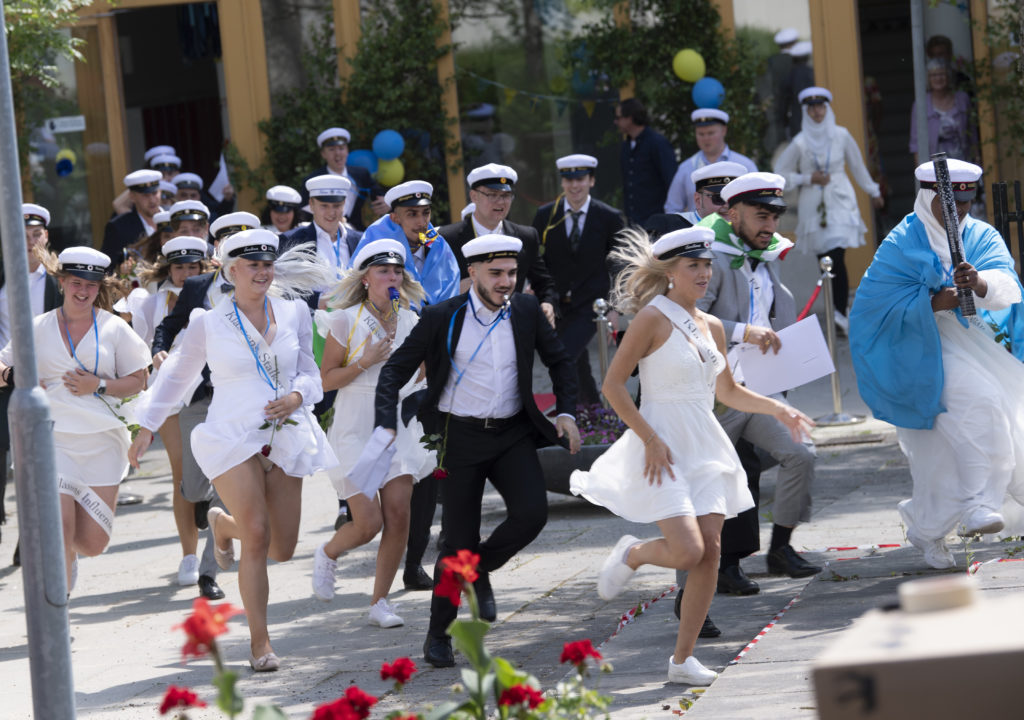Why are Swedish teens in white hats singing and drinking on trucks?

Sweden's streets are filled with jubilant high school students. Why are they there, and what are they doing? The Local looks at the background behind this tradition.
I've just been in town and seen all these young people in white hats milling about on the backs of trucks and tractors. They're screaming and shouting and listening to loud music. What's going on?
All over Sweden, students are celebrating the completion of their final year of secondary education. What you have witnessed is the annual outpouring of emotion and champagne that is widely known as studenten. As Swedish rites of passage go, this one marking graduation from gymnasium is by far the most exuberant.
Students at Kungsholmens Gymnasium in Stockholm write messages in each others' studentmössor. Photo: Magnus Hjalmarson Neideman/SvD/TT
I see. But what are those silly hats that make them look like they've just got off on shore leave?
The stylish white caps worn by school graduates are in fact a relic from bygone days. In the middle of the 19th century, students at Uppsala University began wearing the sort of headgear that had already become popular in Denmark and Germany.
The fashion took off and for university students the general wearing of white peaked caps persevered for more than a century until the revolutionary spirit of 1968 deemed them antiquated and bourgeois.
But the studentmössa, as it is called, refused to die, and has retained its popularity among school-leavers.
What else happens that day?
The graduates often start the day by singing a traditional song about happy days of youthful abandon, all rounded off with a hearty "hurrah". The "hurrahs" get heartier still for those who choose to indulge in a champagne breakfast with their classmates.
Then they board the tractors and trucks?
No, not yet. In a throwback to pre-1968 days, when Swedish students had to complete a final exam before finishing school, the students now often gather in the school building before rushing out to meet their extended families in what is referred to as an utspring. The jubilant youths then get all manner of gifts hung around their necks on ribbons and everyone says "hurrah" a lot again.
Students from a gymnasium in Västerås 'springer ut' (run out of the school) in June 2021. Photo: Fredrik Sandberg/TT
But what about the parade floats?
That's the next bit. Groups of students often club together to hire floats for the day, which they then deck with balloons and bundles of birch twigs. Having successfully given their parents the slip, the students proceed to honour the occasion with a display of unbridled hedonism.
No passer-by can remain oblivious to the excesses of studenten, as an endless stream of party music comes blaring from the floats and students knock back champagne as fast as they possibly can, seemingly mistaking it for lemonade.
Students in Malmö celebrate on the back of trucks on June 7th, 2022. The trucks are often decorated with rude puns or the names of the students riding on the back. Photo: Johan Nilsson/TT
So they laugh, sing and make merry. Then what?
Then they get ready for the evening ahead when they do it all again. Except in a bar or nightclub rather than on the back of a truck.
Which is when I can start breathing a sigh of relief.
Yes, until next year, when a fresh batch of graduates reminds you once more of the distance between yourself and the joys of youth.
First published in 2007. Updated in 2023.
Comments
See Also
I've just been in town and seen all these young people in white hats milling about on the backs of trucks and tractors. They're screaming and shouting and listening to loud music. What's going on?
All over Sweden, students are celebrating the completion of their final year of secondary education. What you have witnessed is the annual outpouring of emotion and champagne that is widely known as studenten. As Swedish rites of passage go, this one marking graduation from gymnasium is by far the most exuberant.
I see. But what are those silly hats that make them look like they've just got off on shore leave?
The stylish white caps worn by school graduates are in fact a relic from bygone days. In the middle of the 19th century, students at Uppsala University began wearing the sort of headgear that had already become popular in Denmark and Germany.
The fashion took off and for university students the general wearing of white peaked caps persevered for more than a century until the revolutionary spirit of 1968 deemed them antiquated and bourgeois.
But the studentmössa, as it is called, refused to die, and has retained its popularity among school-leavers.
What else happens that day?
The graduates often start the day by singing a traditional song about happy days of youthful abandon, all rounded off with a hearty "hurrah". The "hurrahs" get heartier still for those who choose to indulge in a champagne breakfast with their classmates.
Then they board the tractors and trucks?
No, not yet. In a throwback to pre-1968 days, when Swedish students had to complete a final exam before finishing school, the students now often gather in the school building before rushing out to meet their extended families in what is referred to as an utspring. The jubilant youths then get all manner of gifts hung around their necks on ribbons and everyone says "hurrah" a lot again.
But what about the parade floats?
That's the next bit. Groups of students often club together to hire floats for the day, which they then deck with balloons and bundles of birch twigs. Having successfully given their parents the slip, the students proceed to honour the occasion with a display of unbridled hedonism.
No passer-by can remain oblivious to the excesses of studenten, as an endless stream of party music comes blaring from the floats and students knock back champagne as fast as they possibly can, seemingly mistaking it for lemonade.
So they laugh, sing and make merry. Then what?
Then they get ready for the evening ahead when they do it all again. Except in a bar or nightclub rather than on the back of a truck.
Which is when I can start breathing a sigh of relief.
Yes, until next year, when a fresh batch of graduates reminds you once more of the distance between yourself and the joys of youth.
First published in 2007. Updated in 2023.



Join the conversation in our comments section below. Share your own views and experience and if you have a question or suggestion for our journalists then email us at [email protected].
Please keep comments civil, constructive and on topic – and make sure to read our terms of use before getting involved.
Please log in here to leave a comment.